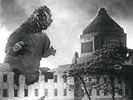Eye For Film >> Movies >> Godzilla (1954) Film Review
Ishiro Honda's Godzilla (or Gojira) is Japan's first science-fiction film, Japan's first "kaiju eiga" (monster movie), which introduced one of the most iconic cinematic creatures of the last century, spawning several remakes and well over 20 sequels. It is, in short, a pioneering behemoth in the history of Japanese cinema, leaving giant footprints in its trail that many have followed but few have filled so impressively.
Following the mysterious disappearance of several boats in the Pacific, reports come in from Odo Island of the return of a giant sea monster, named Godzilla in local legend. Accompanied by his daughter Emiko (Momoko Kochi) and young salvage expert Ogata (Akira Takarada), Dr Yamane (Takashi Shimura) leads a scientific expedition to the remote island, where he sees for himself the creature in all its devastating might. Yamane realises that Godzilla is a relic of the Jurassic period whose peaceful existence on the sea floor has been disturbed by recent H-Bomb tests.

As Godzilla goes on a fire-breathing rampage through Tokyo, it seems that the only person capable of saving Japan is Emiko's would-be fiance, the reclusive Dr Serizawa (Akihiko Hirata), but he is just as concerned about the likely consequences of letting anyone see his new weapon of mass destruction - until, that is, he devises a plan that gives him one shot at bringing an end to both threats.
"What you see is not a movie!" yells a news reporter into his camera as he watches the city and its suburbs reduced to rubble before his eyes - and in a way he is right. Made shortly after the entire crew of a Japanese fishing boat were accidentally irradiated during an American H-bomb test in the Pacific (an event to which the film's opening scene clearly alludes), Godzilla gives monstrous form to a nation's all too real fears about the power of nuclear weapons. Of course, the spectacle of a rubber-suited dinosaur stomping and burning its way through highly realistic miniatures of downtown Tokyo is terrifying in its own cinematic terms, but the greater horror lies in its direct evocation of Japan's experiences at the end of the Second World War, when Tokyo was fire-bombed night after night while Hiroshima and Nagasaki were atomised.
The special effects in Roland Emmerich's 1998 remake may have been bigger and better, but what it lacks is the chilling seriousness of the original, which focuses not only on the monster's awesome havoc, but also on the great human suffering left in its wake - the dead, the injured, the orphaned children, the radiation burns, the panicked evacuations, the blazing ruins. In other words, what you see is not simply a monster movie, but rather the ravages of war in all their grim reality.
Godzilla is a tale of two monsters. One is an implacable force of nature that flattens whatever crosses its path, but the other is the far more subtle urge to destroy within humans themselves, and it is Serizawa's noble struggle with this aspect of himself that gives the film its emotional trajectory towards the final, deeply moving scenes. At first, Serizawa seems the very model of an evil scientist, even sporting a black eye-patch and rumoured to have collaborated with the Germans on a doomsday device. In fact his patch conceals a war injury, for he has seen the horrors of war right up close, and his experiences have made the potential military applications of his own research utterly repellent to him. Terrified that his secret will get out, he has become an isolated, tormented figure, played with haunted dignity by Hirata. He is without doubt the film's true, tragic hero, alone realising that Godzilla is not the only monster that must be destroyed.
As Japan's parliamentary Diet is shown debating whether Godzilla's origins in the nuclear bomb tests should be revealed to the general public, one Senator (Seijiro Onda) declares, "If we publicise such a thing it will harm international relations." This, it turns out, was no mere paranoia, for when Godzilla was exhibited to English-speaking viewers as Godzilla: King Of The Monsters, all references to nuclear power were carefully excised, stripping the original film of its core anti-war message, while leaving in its place little more than an anodyne and vaguely incoherent, creature feature. Needless to say, the addition of a few new scenes featuring Raymond Burr as an American reporter represented only a dubious sort of compensation for the monstrous destruction that the American editor wrought upon Honda's vision.
So now that Godzilla has for the first time been released in its original Japanese version, Western viewers can at last see the reptilian monster's revenge as Honda (and nature) intended.
Reviewed on: 22 Feb 2006


















